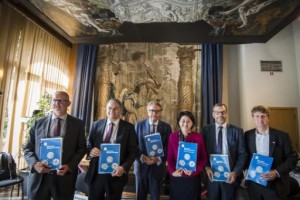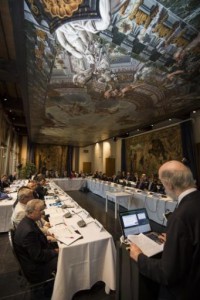UNEP launch their Global Waste Management Outlook
Professor David C Wilson, the editor-in-chief, presented UNEP’s Global Waste Management Outlook (GWMO) at its launch at the ISWA World Congress in Antwerp on Monday 7th September. The GWMO provides the first comprehensive global overview of the state of waste management around the world in the 21st century. It sets out a series of five Global Waste Management Goals and a call for action addressed to individuals, businesses, governments and the international community. There are three main GWMO Outputs, with the main report of around 300 pages being accompanied by an 8-page infographic Summary for Decision Makers and a 2-page flyer for a general audience. The main report can be downloaded here, and the summaries (plus the latest Regional Waste Managment Outlooks) here.
Waste management is a key utility service and a critical element of the infrastructure that underpins Society – it is often rated in the top three priorities faced by developing country cities – but, tends also to be ‘taken for granted’ and does not often appear towards the top of national or international political agendas. This was recognised at the Rio+20 Sustainable Development Summit in 2012, following which the UNEP Governing Council requested UNEP: ‘to develop a global outlook of challenges, trends and policies in relation to waste prevention, minimization and management … to provide guidance for national policy planning’.
Waste management is a cross-cutting issue impacting on many aspects of society and the economy. It has strong linkages to a range of other global challenges such as health, climate change, poverty reduction, food and resource security and sustainable production and consumption. The five Global Waste Management Goals set out in the GWMO are all to be found within the 2030 Agenda for Sustainable Development (agreed by the world’s leaders in New York just a couple of weeks after the launch of the GWMO), but making progress toward them would contribute to achieving 11 out of 17 SDGs.
The GWMO estimates that around 2 billion people worldwide lack access to a basic waste collection service, while around 3 billion lack access to controlled disposal services for municipal solid wastes. So the first two Global Waste Management Goals are to ensure by 2020 access for all, to adequate, safe and affordable solid waste collection services; and (2) to stop uncontrolled dumping and open burning. Goal 3 takes this one step further, by 2030 to achieve sustainable and environmentally sound management of all wastes, particularly hazardous wastes. As part of the Global Call for Action, the GWMO is calling on the international community to mobilise international aid, and environmental and climate funds, to assist the poorest countries to provide basic waste services to all in urban areas. Specifically, to increase the proportion of funding directed to waste management by a factor of 10, from the 0.3% achieved over the last decade.
The remaining Global Waste Management Goals focus: (4) on ensuring by 2030 a substantial reduction in waste generation through prevention and the 3Rs (reduce, reuse, recycle), thereby creating green jobs; and more specifically, (5) cutting by a half per capita global food waste at the retail and consumer levels and reducing food losses in the supply chain.
The technologies required to ‘solve’ the waste problem are largely already available, and have been much written about. The GWMO has chosen rather to focus primarily on the less fashionable ‘governance’ issues which need to addressed to establish a sustainable solution –including the regulatory and other policy instruments, the partnerships and, crucially, the financing arrangements– and to provide a ‘toolkit’ to be used in developing a solution appropriate to the local situation.
The GWMO has been prepared by an international team for UNEP’s International Environmental Technology Centre (IETC) and ISWA. It is the result of two year’s work, including broad international peer review of three main drafts. The team was headed up by DCW as editor-in chief and lead author. The lead author of the data review chapter was Dr Prasad Modak, EMC India; waste governance, Dr Ljiljana Rodic, Wageningen University; and waste financing, Reka Soos, RWA Romania. Other co-authors were Ainhoa Carpintero, IETC (project manager); Dr Costas Velis, University of Leeds (Academic advisor); Professor Mona Iyer, CEPT University, India (Case study editor) ; and Otto Simonett, Zoi Environment (Communications advisor).

DCW launching the GWMO


